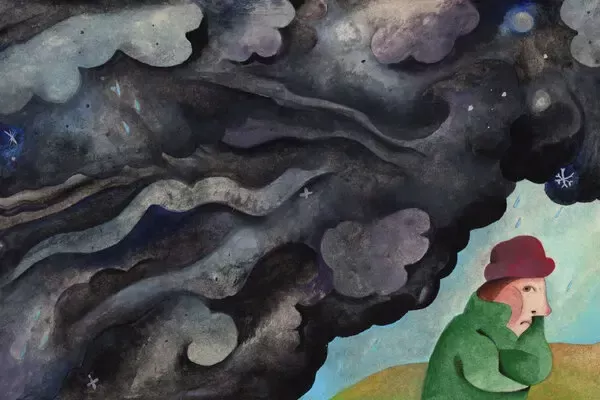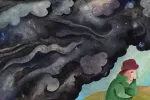Depression & Addiction: Signs, Symptoms & Treatment

Depression & Addiction: Signs, Symptoms & Treatment
Home What is Addiction – Causes, Symptoms & Evidence-Based Treatment Depression & Addiction: Signs, Symptoms & Treatment
Drug and alcohol abuse can make depression and mental illness worse, and depression can increase the risk factor for addiction. The reverse is also true, in that addiction can raise the odds for depression.
When addiction and depression are present in the same person at the same time, these disorders are said to be comorbid, or co-occurring. Depression and addiction commonly co-occur, and each condition can complicate the other.
Depression and addiction are complexly intertwined, requiring comprehensive dual diagnosis treatment programs for optimal support. Treatment aims to manage both conditions at the same time, often using both medications and therapies together.
Understanding Depression
Nearly a quarter of American adults in 2020 had a form of mental illness, with mood and anxiety disorders being some of the most common.
Depression is a mood disorder that can cause symptoms that are significant enough to impact daily life functioning. Depression can be the result of faulty mood regulation in the brain, an imbalance of chemicals called neurotransmitters that impact emotions and pleasure, medical issues, stressful life events, medications, and genetic risk factors, Harvard Health explains. It is a complex mental illness that can vary in severity from mild to severe.
Addiction is also considered a mental health issue that can have many overlapping vulnerabilities with depression. Drugs and alcohol make changes to the brain’s pathways, reward and pleasure center, and the chemical makeup of the neurotransmitters responsible for emotional regulation and feelings of pleasure.
Both depression and addiction can double the risk for also struggling with the other disorder when compared to someone who does not have depression or addiction. Studies show that around 40 percent of people with a lifetime history of depression also met the criteria for addiction, while close to 40 percent of people seeking treatment for a substance use disorder in the past year also had a co-occurring and independent mood disorder.
Signs & Symptoms of Depression & Addiction
For a diagnosis of depression, a person will have some of the following signs and symptoms for the majority of most days for at least two weeks, per the National Institute of Mental Health (NIMH):
- Irritability
- Feelings of hopelessness or negativity
- Sad, “empty,” or anxious mood that persists
- Lack of energy and/or fatigue
- Feeling helpless, guilty, or worthless
- Talking and/or moving more slowly
- Restlessness
- Sleep difficulties
- Appetite and/or weight fluctuations
- Trouble concentrating, making decisions, and memory issues
- Physical issues, such as digestive problems, headache, cramps, or aches and pains without a specific physical cause
- Suicidal ideations
Not all of these symptoms will be present in everyone with depression. Generally, the more symptoms a person has, the more severe the depression.
When someone with depression also struggles with addiction, symptoms are often worse and more heightened. The National Institute on Drug Abuse (NIDA) lists the following signs and symptoms of addiction:
- Using drugs or alcohol for longer than intended or taking more than intended
- Taking more drugs or alcohol than before to feel the effects, establishing tolerance
- Making several attempts to stop using drugs or alcohol that are unsuccessful
- Spending a lot of time using substances, recovering from them, or determining how and when to get them again
- Drug and/or alcohol use that interferes with work, school, or home obligations
- Cravings, or a strong desire, to drink alcohol or use drugs
- Giving up activities or events that were previously important due to substance use
- Continuing use despite social or interpersonal issues related to substance abuse
- Ongoing substance abuse in physically risky situations
- Knowing that drug or alcohol use is causing physical or emotional issues and using anyway
- Withdrawal symptoms when drugs or alcohol wear off
As with depression, the more of these signs and symptoms that are present, the more severe the addiction. Comorbid depression with addiction can elevate the severity as well.
Common Types of Depression
There are several different forms of depression with the two most common being major depressive disorder (MDD) and persistent depressive disorder.
The following are different types of depression:
- Major depressive disorder (MDD): When someone has at least five symptoms of depression for at least two weeks, this is called a major depressive episode, and people with MDD have had at least one episode. MDD can be recurrent, and episodes can come and go.
- Persistent depressive disorder: With this form of depression, the low mood persists for at least two years and can also be interspersed with major depressive episodes. In between episodes, symptoms are often less severe but still present.
- Bipolar depression: Bipolar disorder is a separate disorder, but the extreme lows of the disorder are a form of depression. The low mood swings of bipolar depression are also often countered by extreme highs, called mania.
- Postpartum depression: After giving birth, women may experience feelings of indifference, sadness, anxiety, and exhaustion that characterize this extremely common form of depression. This form of depression can make it difficult for new mothers to properly care for themselves and their babies.
- Seasonal affective disorder (SAD): With SAD, symptoms appear in the fall and winter months, as there is less natural light. They typically lift with the return of sunlight in the spring and summer. Increased sleep, weight gain, and social withdrawal are common during the affected months.
- Psychotic depression: Often accompanied by a major depressive episode, this form of depression also includes delusions (disturbing beliefs that are false and fixed) and/or hallucinations (seeing or hearing things that are not there).
Why Do Depression & Addiction Often Overlap
Depression and addiction have many of the same risk factors and vulnerabilities, making them more probable to occur in the same person at the same time.
Both addiction and depression likely have genetic components, and overlapping brain regions can be involved in both disorders, NIDA explains. The same environmental influences that can impact depression can also make someone more likely to use drugs or alcohol. Things like trauma, stress, and negative childhood experiences can all be risk factors for both.
Either disorder can precede the other. For example, when a person uses drugs or alcohol regularly for a prolonged period of time, changes are made in the brain that can make it harder to feel pleasure without the substance. Depression is often a side effect of drug and alcohol withdrawal. Addiction can therefore make someone more likely to also develop depression.
Drug and alcohol abuse can also be a form of self-medication for depression, which can seem to be effective in the short term, but it worsens the issue over time. Substance abuse can lead to worsening symptoms, more suicidal thoughts and behaviors, and the potential for drug dependence and addiction.
Finding Treatment for Depression & Addiction
Co-occurring depression and addiction must be treated simultaneously through a specialized treatment program that works to manage both disorders. Dual diagnosis treatment does exactly that.
With a dual diagnosis treatment program, both disorders are assessed and addressed to ensure that all treatment methods complement each other. Health providers work together to develop a treatment plan to support long-term recovery for both conditions.
In the case of co-occurring disorders, treatment programs often begin with a medical detox program that can provide a safe and secure environment as substances process out of the body. Medications are often used to mitigate possible withdrawal symptoms.
After detox, the next step is often a residential treatment program that can offer continuous support and treatment around the clock for both addiction and depression, including therapies, medications, and support systems.
Medications for Depression
There are several forms of antidepressants available to help treat depression. Some of these medications have abuse potential and cause drug dependence and withdrawal symptoms when stopped suddenly, so it is important to talk to medical and mental health professionals about what options are best when addiction is also a concern.
These are examples of antidepressant medications approved by the FDA to treat depression:
- Serotonin and norepinephrine reuptake inhibitors (SNRIs)
- Selective serotonin reuptake Inhibitors (SSRIs) – such as Trazadone
- Monoamine oxidase inhibitors (MAOIs)
- Atypical antidepressants
- Tricyclic and tetracyclic antidepressants
- Neuroactive steroid gamma-aminobutyric acid (GABA)-A receptor positive modulator
- N-methyl D-aspartate (NMDA) antagonist
Everyone reacts differently to medications. It is important to report any side effects, especially worsening depression or suicidal thoughts, to a health care provider right away. These medications should not be stopped or skipped without medical intervention.
Therapies for Addiction & Depression
Therapies for addiction and depression often include the use of Cognitive Behavioral Therapy (CBT) that will involve both group and individual sessions. CBT can increase mindfulness by helping a person to understand how thoughts and feelings are contributing to actions. These feelings and thoughts can be analyzed for increased self-awareness.
CBT can work to point out potential triggers and build healthy coping mechanisms to positively change behaviors and actions in the future. Once a person knows what stressors they have and how to best manage them, both depressive symptoms and the need for drugs and alcohol can be reduced. CBT can help with self-regulation and control as well.
How to Find the Right Program for You
When looking for a dual diagnosis treatment program for addiction and depression, do your homework. Call around and talk to treatment centers directly, take tours, and check reviews.
Ask the following questions when calling a treatment center:
- What types of programs do you offer?
- What is your experience with dual diagnosis treatment?
- How long is the program?
- What types of staff members are on site?
- What are the licensing and accreditation of both the staff and the center?
- What does a daily schedule look like?
- What types of amenities are provided?
- What types of support are available for families?
- What types of aftercare programs are offered?
- How is payment handled, and what options are there?
A treatment center for managing addiction and depression should have the following:
- Inpatient or residential treatment options with the ability to remain on site for at least three months or longer, as needed
- Current licensing and accreditation
- Ability to smoothly transition clients from medical detox to residential treatment and into transitional housing
- Specialty dual diagnosis programs
- Highly trained and experienced medical and mental health professionals
- Aftercare programs and recovery support, such as 12-step and peer support options
How to Help a Loved One Struggling With Depression & Addiction
When a loved one is struggling with depression and addiction, it is important to be supportive and loving while guiding them toward getting professional help through a comprehensive treatment program.
Be assertive in your conversations, and be careful to avoid enabling behaviors. Set clear boundaries and expectations, and don’t make excuses for their behavior.
While in a treatment program, families play an important role in supporting loved ones. Educate yourself on both addiction and depression as well as the treatment itself, so you can have a better understanding of what to expect and how to best support them in recovery. Attend family or group therapy sessions and family events.
It is important to also take care of yourself during this time, which can include attending peer support groups for families and loved ones of people struggling with mental health and/or addiction.
References
Highlights for the 2020 National Survey on Drug Use and Health. Substance Abuse and Mental Health Services Administration (SAMHSA).
What Causes Depression? (June 2019). Harvard Health.
Comorbidity: Addiction and Other Mental Illnesses. (September 2010). National Institute on Drug Abuse (NIDA).
Assessment and Treatment of Mood Disorders in the Context of Substance Abuse. (June 2015). Dialogues in Clinical Neuroscience.
Depression. (February 2018). National Institute of Mental Health (NIMH).
The Science of Drug Use and Addiction: The Basics. (July 2018). National Institute on Drug Abuse (NIDA).
Types of Depression. (2021). Depression and Bipolar Support Alliance (DBSA).
Why Is There Comorbidity Between Substance Use Disorders and Mental Illnesses? (April 2020). National Institute on Drug Abuse (NIDA).
Depression Medications. (November 2019). U.S. Food and Drug Administration (FDA).
Article Courtesy: https://bocarecoverycenter.com/addiction/depression/
Posted 2 years ago



Add a comment